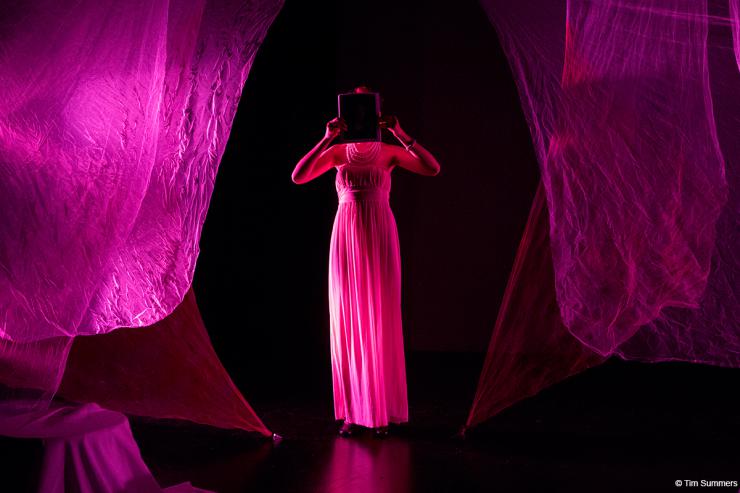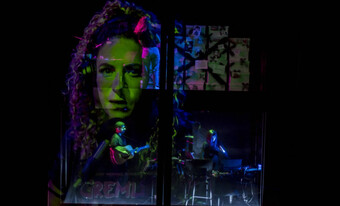Political (Act)ivism and the (New) Avant-garde
What is avant-garde theatre today? It’s easy enough to look back on last year’s vanguard, but how can we define the movement we are in the midst of? In her series, Kate Kremer explores the question of the new avant-garde.
There is a prevailing sense that the millennial avant-garde is not creating political, activist theater to the same extent as the avant-garde of the ’60s and ’70s. I don’t think this is true. But I do think that the challenge has changed.
For those who define the avant-garde by its formal and conceptual interventions, the vanguard is the “cutting edge.” It’s a matter of slicing open the narratives that currently contain us. For those who believe that activism is most central to the avant-garde, the focus is on the margins, on the task of bringing new voices into the conversational center. Margin, edge—these are terms for the same border, breached from opposite sides.
In the theater of the 1960s and 70s, there was a certain synthesis of these two positions. Julian Beck and Judith Malina mingled art and politics, pushing formal and political boundaries and bringing theatricality to their political action. The Performance Group, El Teatro Campesino, The Actor’s Workshop, The San Francisco Mime Troupe, Bread and Puppet Theater, and many other companies likewise developed work that was both formally innovative and politically implicated. For many, the dissolution of traditional hierarchical structures and deconstruction of narrative forms were the organizational and formal expressions of their revolutionary politics. Edge and margin aligned.
But the sense of an opposition persists. You even hear it in the way that artists whose work is obviously “political” have a tendency to hedge, to hold the term at arm’s length. Take Mac Wellman’s defense of art for its own sake in Linda Yablonsky’s 1995 interview in BOMB Magazine. While affirming that he considers his own work “political,” he adds, “But it can’t be reduced to slogans…Art is important not because it can be translated into something else, but because art possesses and embodies its own good, its own special (and spiritual) value, period. People who try to argue for its social utility do it a disservice.”
Or consider a similar moment of ambivalence in Richard Maxwell’s 2008 BOMB interview with Young Jean Lee. He points out that her recent plays, Songs of the Flying Dragon and The Shipment had “taken on a kind of political aspect,” and notes that although he tends to feel that “political theatre doesn’t work by and large,” Lee had pulled it off by making the plays feel personal. He attributes her success to her ability to make these political plays feel intensely personal.
For her part, Lee locates the difficulty of creating political theater in the process of “trying to trap the audience so they can’t escape through…their dismissive loopholes. It’s like as soon as you’re in a room where there’s anything political going on—and I’m the same way—I’m just instantly looking for a way out. I don’t want to be preached at.”
Whereas Wellman objects to the label “political theater” because it implies and imposes on art a putatively higher purpose, Maxwell’s and Lee’s reservations are more pragmatic—they suggest that political theater is difficult—that it demands a personal, nuanced, even tactical approach to forestall an audience’s alienation.
Which prompts the question: is it harder to make political theater than it used to be? Have audiences become more cynical and more wary of messaging? Have artists? And if so, how does this change activist theater?
There was some ambivalence among the people I interviewed about the political impact of the avant-garde. But there was also a strong sense of pragmatism, a strategic way of thinking about theater that has less to do with wide-eyed idealism than it does with a desire to use all the tools at one’s disposal to explore the problem at hand.
I spoke a few weeks ago with Seattle performance artist Erin Pike, who just performed her one-woman show That’swhatshesaid (written by Courtney Meaker) at On the Boards’ Northwest New Works Festival. The piece takes lines spoken by female characters from TCG’s list of the top ten most produced plays of 2013-14 and puts them in the mouth of one female character in an effort to explore how women are represented in the theater.
It’s Erin’s conviction that successful performance pieces should “poke at things,” whether those things are “social and political or individual and emotional.” That’swhatshesaid is a fascinating experiment at the intersection of those two approaches. Given that half of the plays on TCG’s list this year are by women, the piece is an exploration not just of how women are portrayed, but also of how they portray themselves.
Erin noted that because of its tendency to defamiliarize, avant-garde performance can be influential in the way that it offers a new perspective on art itself and shifts how people may experience other art going forward. “Does it influence the rest of their experience of the world?” Erin asked wryly. “To be determined.”
In the early spring, I had a wonderful and wide-ranging talk with Caitlin Sullivan, founding member and current artistic director of the Seattle-based Satori Group. We talked about the history, influences, and interests of the ensemble. Caitlin noted that Satori likes to ask the big philosophical questions, “but also to make things that are immediately theatrically digestible and visceral, like food, dirt, music—things that feel like things. The idea is to get those big questions into the DNA of the world rather than asking them explicitly onstage.”
What ties the group together, she suggested, is the how of a production. Everyone in the group is responsible and implicated in the process of making the work—and this is also how they deal with their audiences. What part of yourself, they ask, is in the room? What part of yourself is at stake? In raising these questions, they reveal the artistic and political implications of how a work gets made.
There is a prevailing sense that the millennial avant-garde is not creating political, activist theater to the same extent as the avant-garde of the ’60s and ’70s. I don’t think this is true. But I do think that the challenge has changed. Whereas the earlier generation’s challenge was in some sense to merge the abstract and activist, the intellectual and the mobilizing, the challenge of this generation’s avant-gardists is to merge the political and the intimate: to engage, on a personal level, their subjects, their audiences, and the formal capacities and limitations of the theatrical medium.
If this avant-garde does not seem as visibly political, that may be the point. Tricky, nuanced, visceral, funny, and intimate, this avant-garde may be trying to infiltrate the barriers imposed by contemporary reticence and misgivings about acts of revolution.
***
Photo by Tim Summers. Erin Pike in That’swhatshesaid at On the Boards’ Northwest New Works Festival.












Comments
The article is just the start of the conversation—we want to know what you think about this subject, too! HowlRound is a space for knowledge-sharing, and we welcome spirited, thoughtful, and on-topic dialogue. Find our full comments policy here
Thank you for instigating this interesting discussion, Kate. The terms "avant-garde" and "political", and how they are linked together in theatre & performance, is one worth exploring even more. It seems that you jump from these distinct yet often overlapping terms, to "activist theatre", when I do not think all of them are synonymous.
For example, a work can be avant-garde based on how the work is created, performed, or both. A work such as Mabou Mines´ "MahabarANTa" or The Wooster Group´s "Brace Up!" are avant-garde because their theatrical strategies went against common practice at the time, just as Stanislavski´s early naturalistic stagings of Chekhov were "experimental" in late-19th century Russia, in contrast to the prevailing style of the time. Often what is considered "avant-garde" is contextual.
A number of works today can be covertly political due to the nature of how they challenge form, and thus challenge our own assumptions about what performance is (or "should" be). Examples could be anything from Punchdrunk`s "Sleep No More" to Side Pony´s "The Confidence Man" to Ant Hampton´s autotheatre pieces.
There are also many plays that are highly political, yet whose form is not that remarkably avant-garde (not in the sense that you cite, such as the Living Theater). These could be the later plays of Pinter, like "Ashes to Ashes", "Mountain Language", and "One for the Road", all eloquent depictions of torture and violence; or the work of Belarus Free Theatre, who have been living in exile from their home country because the content of their work is considered taboo and anti-government.
I´ve spoken with groups in Turkey and Iran who are considered "political" and "avant-garde," simply by definition that they are working independently from any state-sponsorship, which is the prevailing norm in those regions. However, if one were to look at their work through the lens of contemporary American understandings of "avant-garde", there is little overtly political or daring about their work. Again, context is key.
Given that the two examples you cited in your article were both from Seattle, perhaps you could discuss in greater detail how these pieces are avant-garde and/or political within the context of work currently being done in Washington state and the Northwest?
PS - just saw Applied Mechanics "We Are Bandits" last night. Multiple storylines, audience pucks which lines to follow as the performers move through a remarkably designed gallery space (being actively painted as the perfomance occurs) with both live music and soundscape. The show is about a group of women (as well as two collaborating men) attempting to claim/control a narrative about themselves, public space, and how both society and individuals does/doesn't change before and after a gathering in the square. An absolutely great example of avant-garde wrestling with political theater in a deeply engaging way. Worth checking out. #WeAreBandits
I for one do not want to sit through an Odets play or a Living Theater style everyone-take-off-your-clothes-and-be-political play, thank you. And that's not a knock on Odets nor the Living Theater. But that moment has passed and those works feel dated. Nothing wrong with that! The idea that new theater ensembles would create something "like the 60s" makes me want to scream. That was 50 years ago! FIFTY! OK, caps and exclamation marks. I'm getting heated. Because I've had that dead and buried "in the 60s" conversations many times and it makes my entire brain glaze over. How boring, to go to the theater, and instantly know I'm seeing an experimental play, or a political play, or an avant garde play, because the markers are so blunt and tired that I can already tell you what I'm about to see before I get to my seat. For my money, the best political/experimental/avant garde works catches me off guard. It's the moment I didn't see coming, the image I haven't imagined, the story form that pulls me down a rabbit hole I've never fallen down before, that has me talking about it for weeks and forcing all my friends to go.
I'm thrown by the notion that the responsibility for political theater rests on the avant-garde's shoulders. Yes, the "advance guard" is expected to be pushing new ideas or exploring new topics, but theater has long been political - indeed, as Ms. Malpede points out, it's been political since Ancient Greece at the very least - there's nothing new about tackling politics in theater. There are conventional theater companies around the country dedicated to political theater. Places like Interact in Philadelphia dedicate every season to it, and The Women's Project has it embedded in their DNA (unless someone wants to suggest that theater focusing on women is apolitical...) Fairly traditional theaters do it too - in NY, it raises it's head at the Public ("Stuff Happens" "County of Kings" "The Poor Itch" etc), NYTW (Paula Vogel, Tony Kushner) and even, sometimes, on Broadway ("Doubt" "Fela" "Passing Strange" and "Clyboyrne Park" to name a few recent ones...) Plays like "Gideon's Knot" (last season at Interact, this season in DC at the Forum, and Texas at Kitchen Dog) are far from avant-garde, yet wrestle with deeply political issues of race, education, and school violence, all through the lens of a personal story in a classroom.
If the avant garde fears boring or alienating its audiences by tackling politics, (and I question that - Pig Iron's "Pay Up" tackled the financial system wonderfully last year) perhaps they need to re-examine they way they're telling their stories or making their points. Sure, works of theater that are baldly political are boring - that's why Shaw kept his lectures as prefaces to his plays. But bold, well made work of any stripe that engages the audience's imagination are going to succeed, regardless of how political their agendas are.
Of course, if you want to do something that's really new to the American theater scene, just make some really well written work that expresses a politically conservative point of view. That would truly be avant-garde in today's American theater scene.
Robert, thanks so much for clarifying a crucial point: that there is wonderful, highly political theater being done outside of the "avant-garde" (as well as within it). It's absolutely true and it is also one of the things that I find difficult about writing this blog--I find it difficult to draw a boundary line between "traditional" or "mainstream" and "avant-garde" theater. I don't mean to imply that the mantle of political engagement falls only on the shoulders of the avant-garde--only to explore the ways in which the "avant-garde" has historically been a locus of both aesthetic innovation and political activism--and the ways in which those two things have sometimes been at odds and sometimes very marvelously combined.
Agreed, because: The best, most lasting and powerful political art is always intensely character-driven: Euripides, Ibsen, Genet (just for starters). And it is profoundly poetic. We've been duped (by McCarthyism, actually) into "thinking" otherwise. But the left has always been unkind to its artists. Jack Lawson told me the most hurtful thing that was ever said to him was said by Mike Gold (they were both communists, I am not and have never been): "John Howard Lawson: Bourgeois Hamlet of Our Time" wrote Gold in the New Masses.
Good essay, but I believe it leaves out a vital insight. For while it is (alas) indeed harder to make political theater today than it was in the late sixties and early seventies, it is NOT (primarily) because audiences are more cynical (and wary of messaging) or because today's avant-gardists [love that word!] are more interested in merging the political with the intimate than with the mobilizing.
Rather, the main reason it is more difficult to make political theater these days is because back in the sixties you could question authority (say, for instance, the motives behind those who promoted -- and then profited from -- the Vietnam war at the expense of so many young people) and only risk punishment from authority figures.
Once people began to honestly give peace a chance, however, the empire cleverly struck back by putting non-white, non-male people in positions of power and fame as figureheads, pleasing the masses -- and thus making the risk for political theatermakers who question authority (and the endless overseas wars they promote and profit from) far greater. For it is far more hurtful to be called a racist or sexist by your own kind than it is to be called unpatriotic by some authoritarian warmonger.
So be proud of those who are still willing to risk it. After all, as Aristotle said, ideally an artist should make something happen in space in time... not just in possibility.
YES. thank you for putting these observations to words!